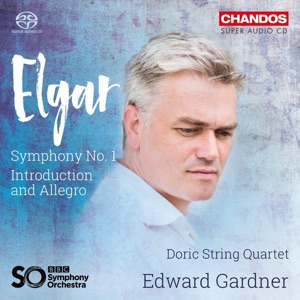Rare are the conductors who do equally well by Elgar’s two symphonies. Edward Gardner is a case in point. His version of the Second Symphony was fast and shallow. This version of the First, similar in approach, makes a somewhat better impression. It’s not perfect by any means, but it has definite high points. The motto theme at the start is edgier than usual, and more flowing–quite similar, in fact, to Elgar’s own recording–while the main body of the movement presses forward urgently. The scherzo, though, is simply too quick. It rushes by in a blur of insufficiently articulated strings.
The best movement, clearly, is the Adagio, which proceeds sensitively, with just the right feeling of serenity alongside an undercurrent of something deeper. It’s a very beautiful performance. Sadly, Gardner leads a relatively glib account of the finale. The return of the motto at the end hardly produces the feeling of “breakthrough” that Elgar intended, and the closing pages are played too quickly to accumulate the necessary sense of joy.
It only remains to be said that the Introduction and Allegro feels much the same: too fast, too thin in texture, too little rhetorical emphasis. It’s an approach that would have worked well for, say, Dumbarton Oaks, but Elgar, needless to say, isn’t Stravinsky. Chandos’ sonics are well balanced and clear, but light in the bass, just like the performances themselves. Elgarians might be interested in this; I can live without it, despite admirable moments.
































